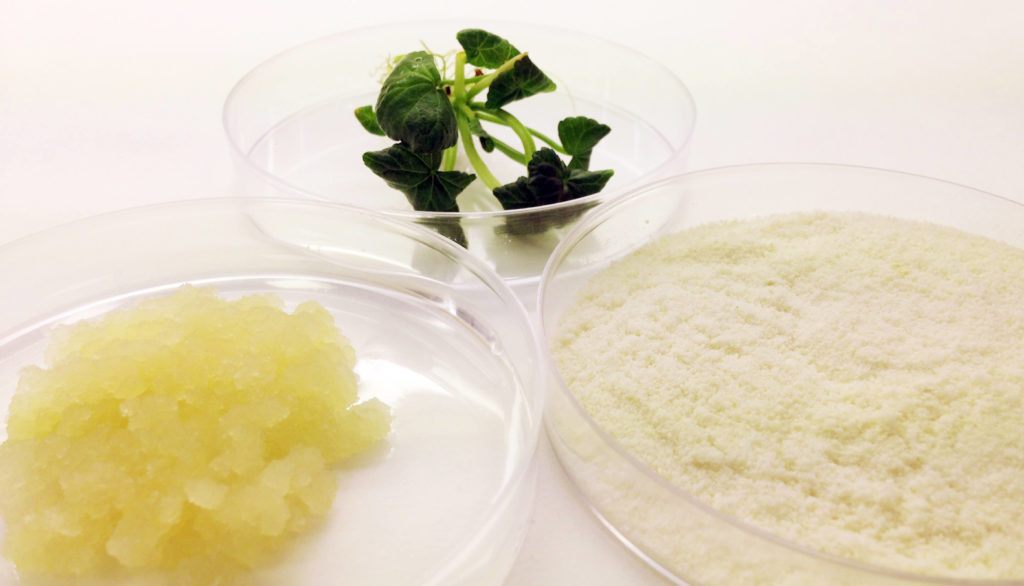
Plant Stem Cells in the personal care sector
Stem cells have been in the spotlight during the last years, due to their huge potential in the healthcare and beauty sectors. While in medicine there has been a lot of research on the uses of human stem cells, it has not been the same in the personal care industry.
The literature and marketing that surround stem cell applications in beauty and personal care is often confusing, leading to views that might not be at all true, giving way to misleading impressions that live-animal cells are used, when in reality, the majority of companies from this sectors work with Plant Stem Cells.
As experts in plant stem cells, at Vytrus Biotech we want to talk about how plant stem cells are used in cosmetics and dermocosmetics, why are they different from the animal ones and what huge advantages they represent.
How are plants and animals stem cells different?
Plant stem cells are also called totipotent cells. They are primary cells from which life is born. Unlike animal or human cells, plant stem cells have the capability to evolve from a differentiated and specialized state to an undifferentiated one, and in the same way, one single plant stem cell, maintained under appropriate conditions, can regenerate a complete and functional plant.
As totipotent cells are in continuous division due to their self-renewal capacity, they can be propagated in vitro becoming a highly useful tool for the acquirement of high yields of valuable phytochemicals.
Plants keep a constant pool of these totipotent cells, so they constitute an endless natural source of cells which repair and regenerate damaged tissues by replacing dead cells that stop functioning. These regenerative properties are the ones that have raised great interest in the cosmetic sector.
Why totipotent cells?
The science behind the use of totipotent cells involves breaking a plant stem cell so it is dead and taking the content of the cell to use it as an ingredient. There are several ways of working with plant stem cells, and their potential for future applications is huge.
The content of totipotent plant cells offers a very sophisticated cocktail of natural molecules that offers an exciting opportunity for applications in skin and hair care. Many companies are already using ingredients to great effect.
These cocktail of molecules is what plants have been developing to ensure their survival and spread. Being rooted, they cannot fight or run away from dangers like animals do, and due to this limiting situation, each plant species has evolved and developed, during millions of years, a very unique mechanism to defend themselves from diverse dangers and threats (animals, microorganisms, climatic adversities, etc.)
Besides being important for plants, these substances or secondary metabolites have potent biological activities that have been extensively applied in pharmaceuticals, fragrances, dyes, biopesticides, etc. Plant cell cultures are emerging as increasingly efficient methods to produce these active ingredients for cosmetic applications.
Plant cell cultures also offer a huge potential for production of recombinant proteins, which is a new technology that hasn’t been used a lot yet, although there are already some successful cases. Plant stem cells can produce complex proteins, which is something animal cells can do as well, but the quality of these proteins is more constant in plant stem cells, and they also offer the potential of reducing the production costs, compared to their animal counterparts. This opens a field with high possibilities for the pharmaceutical, cosmetics, research and industrial sectors.
The advantages of taking the contents from totipotent cells are huge, as they often outperform traditional botanical extract ingredients in clinical trials, and offer a sustainable and natural ingredient source. These allows to work with bioproducts that perform very well on the skin using processes that are very sustainable and efficient.
Natural, sustainable and effective processes
Secondary metabolites often exist at very low concentrations in plants, and in some cases they are only produced or stored in specific organs (roots, flowers, etc) or during particular seasons. Furthermore, whole plant crops depend, to a great extent, on environmental conditions, they are time-consuming and they need extensive land and high water consumption. These are not problems, when working with plant stem cells.
The fact that plant cell cultures can be maintained “in vitro” under controlled conditions regardless of environmental factors, and under sterility conditions, ensures a better standardized and more sustainable product compared to entire plant crops.
Since totipotent cells also contain and produce large quantities of proactive essential substances, such as amino acids, lipids, carbohydrates, vitamins, minerals and antioxidants that perform in a synergistic way along with the dermocosmetic active principles of interest, they contribute to a better effectiveness of the product and to a strengthened cosmetic activity.
All in all, they constitute a natural product with improved properties, represent an unlimited supply and they can be in controlled production conditions, since there is a constant production flow of active ingredient and it is independent from external factors (weather, geopolitics…).
Using plant stem cells not only involves high innovative technologies but represents a very sustainable practice. There is a minimal impact on ecosystems, with independence from natural resources: a drastic reduction of water used (99% less water used than with regular crops), no use of arable soil, and significant reduction of Carbon Footprint, since everything takes place in a lab. The actives made from plant stem cells are free of herbicides, pesticides, heavy metals, VOC and BSE.
Finally, plant stem cell technologies offer the possibility of using rare plants: close to extinction, endemisms, plants in places with difficult access due to geopolitical or geographical issues, etc. This opens the door for helping on the conservation of these species.
Albert Jané Mireia Perez Oscar Expósito










